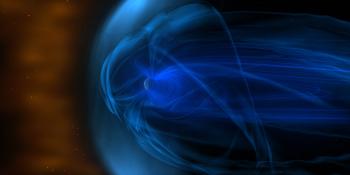Viewing archive of Saturday, 3 April 2004
Solar activity report
Any mentioned solar flare in this report has a scaling factor applied by the Space Weather Prediction Center (SWPC). Because of the SWPC scaling factor, solar flares are reported as 42% smaller than for the science quality data. The scaling factor has been removed from our archived solar flare data to reflect the true physical units.
Report of Solar-Geophysical Activity 2004 Apr 03 2200 UTCPrepared by the NOAA © SWPC and processed by SpaceWeatherLive.com
Joint USAF/NOAA Report of Solar and Geophysical Activity
SDF Number 094 Issued at 2200Z on 03 Apr 2004IA. Analysis of Solar Active Regions and Activity from 02-2100Z to 03-2100Z
Solar activity was at very low levels again today.
Region 582 (N14W51) continues to decay and has lost all penumbral
area in the trailing polarity of the region. Region 587 (S13W03)
has showed a slight decay since yesterday. Region 588 (S12E51)
underwent a little growth and currently has sunspots of opposite
polarity to the solar south of the dominant sunspot. No new regions
were numbered today.
IB. Solar Activity Forecast
Solar activity is expected to be at
very low to low levels.
IIA. Geophysical Activity Summary 02-2100Z to 03-2100Z
The geomagnetic field ranged from quiet to minor storm levels. The
onset of a shock occurred at the ACE spacecraft at approximately
03/0849Z. Preliminary review indicates that there was a
magnetopause crossing of the GOES 12 satellite between 03/1630 and
1730Z. Interestingly, a sudden impulse which was measured as 14 nT
on the Boulder magnetometer occurred at 03/1414Z. The transient may
have been related to the full halo coronal mass ejection (CME) that
occurred on 31 March. Due to the SOHO/LASCO spacecraft maneuvers
that were in progress at the end of March (no images were being
retrieved) there is little certainty at this time as to whether this
shock passage was the result of the full halo CME or related to
other activity that preceded the long duration C3 event. The
greater than 2 MeV electron flux at geosynchronous orbit reached
high levels today.
IIB. Geophysical Activity Forecast
The geomagnetic field is
expected to be at predominantly active levels for 4-5 April. During
the first two days, isolated minor storm conditions may persist
especially in the nighttime sectors, due to the potential of further
transient activity, and the likelihood of a recurrent co-rotating
interaction region. Major storm levels are expected due to a strong
recurrent high speed coronal hole stream that is due to become
geoeffective on 6 April.
III. Event Probabilities 04 Apr to 06 Apr
| Class M | 20% | 20% | 20% |
| Class X | 01% | 01% | 01% |
| Proton | 01% | 01% | 01% |
| PCAF | green | ||
IV. Penticton 10.7 cm Flux
Observed 03 Apr 107 Predicted 04 Apr-06 Apr 105/105/100 90 Day Mean 03 Apr 111
V. Geomagnetic A Indices
Observed Afr/Ap 02 Apr 003/003 Estimated Afr/Ap 03 Apr 015/023 Predicted Afr/Ap 04 Apr-06 Apr 015/020-015/020-025/035
VI. Geomagnetic Activity Probabilities 04 Apr to 06 Apr
| A. Middle Latitudes | |||
|---|---|---|---|
| Active | 30% | 30% | 45% |
| Minor storm | 15% | 15% | 30% |
| Major-severe storm | 10% | 10% | 15% |
| B. High Latitudes | |||
|---|---|---|---|
| Active | 45% | 45% | 30% |
| Minor storm | 25% | 25% | 45% |
| Major-severe storm | 15% | 15% | 25% |
All times in UTC
Latest news
Latest forum messages
Line chart of indicators on the auror video, animated graph trace 48New around here. Carrington and Miyake 27Upper atmosphere phenomena Red sprites and Blue jets 11AR 14093 1To those who say our infrastructure is Solar Storm ready, here's an interesting article. 2
More topicsSupport SpaceWeatherLive.com!
A lot of people come to SpaceWeatherLive to follow the Sun's activity or if there is aurora to be seen, but with more traffic comes higher server costs. Consider a donation if you enjoy SpaceWeatherLive so we can keep the website online!

Space weather facts
| Last X-flare | 2025/05/14 | X2.7 |
| Last M-flare | 2025/05/19 | M3.1 |
| Last geomagnetic storm | 2025/05/17 | Kp6+ (G2) |
| Spotless days | |
|---|---|
| Last spotless day | 2022/06/08 |
| Monthly mean Sunspot Number | |
|---|---|
| April 2025 | 140.6 +6.4 |
| May 2025 | 68.7 -71.9 |
| Last 30 days | 91.2 -24.1 |


